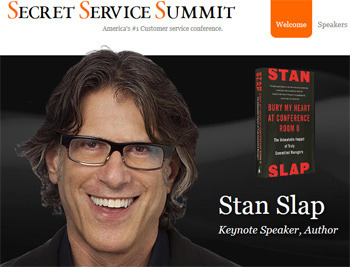Secret Service Summit Interview with Stan Slap & John DiJulius
Check out John’s interview with Stan about his presentation at this year’s Secret Service Summit.
 Let’s get right on top of the bottom line: You must live your personal values at work. This isn’t some woo-woo new paradigm management rhetoric. This is, flat out, the quality of your life.Profitability. Growth. Quality. Exceeding customer expectations. These are not examples of values. These are examples of corporate strategies being sold to you as values. They may be good, important strategies, but they’re strategies all the same. Values are different; values are deeply held personal beliefs.
Let’s get right on top of the bottom line: You must live your personal values at work. This isn’t some woo-woo new paradigm management rhetoric. This is, flat out, the quality of your life.Profitability. Growth. Quality. Exceeding customer expectations. These are not examples of values. These are examples of corporate strategies being sold to you as values. They may be good, important strategies, but they’re strategies all the same. Values are different; values are deeply held personal beliefs.
Family. Integrity. Health. Freedom. These are examples of values. If these are some of your own biggest values and you feel that you have to compromise them in any way to do your job, you may not be fully living your values at work. This isn’t a matter of your intelligence, maturity or skill; there are relentlessly seductive forces being aimed at you as companies attempt to replicate a sense of personal-values fulfillment for managers but insert corporate priorities in its place. You can be a smart and sophisticated manager who has Family as a core value—and easily end up believing that you need to never see your family so you can make a bunch of money to take care of your family by killing the competition and, by extension, other people and their families, even though Harmony and Spirituality are also among your top values. And you can ignore that this is happening even though your value of Integrity, of which issues like accountability, self-awareness and congruency play key parts, is being regularly jeopardized.
Hmmm.
“Manager” can be a great job to have and you may be having a great time doing it. But embedded in any manager’s job description is the requirement to regularly subordinate or compromise personal values in favor of company priorities. This doesn’t mean you’re out there committing vile acts as part of some Faustian bargain (even if you are, pay attention), but it does mean that what your company wants done and how it wants it done must often take precedence over your own deep preferences. This is what it means to be a manager: Serve your company first.
Emotional detachment is a logical reaction in the face of this constant struggle. Warning: Detachment only seems like a safe place. It takes far more energy to be emotionally detached than emotionally committed, to maintain a wall between your inner and outer selves. This is energy that’s no longer available to put into realizing the rest of your life.
Could you choose to live without always meeting your values at work? Sure, but the problem is, life doesn’t get graded on the curve. It’s impossible to spend over half your waking hours ignoring, subordinating or compromising your deepest-held personal beliefs and the other half in total fulfillment of those same beliefs. There is no safe container to store your values while you’re at work; not living your deepest values is going to leak on you.



